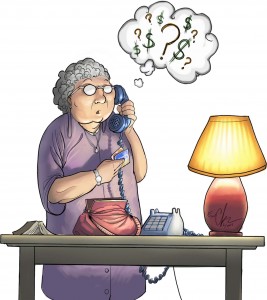#ThrowbackThursday: Caring for Someone With Dementia
March 5, 2015
By Phillip Davis
October 22, 2010
When I moved in with my 86 year-old grandmother 5 years ago, it was to primarily keep her company since my grandfather had just passed away.
Mildred Stradford, or Mrs. Strad, as she is called by to those that know her, has lived in the same home in Richmond, CA since 1968.
After receiving a degree from Virginia State University in Nutrition and Dietetics, she worked for UC Berkeley where she was the first black food service manager for 29 years while raising 4 children and helping raise most of her grandchildren. Last year, she was diagnosed with dementia. Her mind has deteriorated so much so that she has basically reverted to the mindset of a child.
After living with her like this for a while, I thought, ‘This grandma is not the same grandma that washed my clothes and cleaned up after me when I first moved in.’
There was a sharp role reversal; she went from taking care of me and everybody else in the family to being taken care of by the family.
My grandmother used to cook for me after school. Now, I make sure she eats dinner along with her medication.
My two cousins and I mostly work to take care of my grandma. We cook, clean and keep the house in order.
Just as she spent all those years taking care of us tirelessly, we now do all the same things for her.
She is not even the same person anymore. This lady was humorous; something my grandmother was not before her dementia was diagnosed last year.
It can be very interesting at times, almost like getting to know a new person or at least a different side of her.
Being that it is hard to carry on a conversation with her most days, it is necessary to pay close attention, so we can decipher what she is trying to say and get her what she needs.
Pointing to something that she might not remember the name of is an effective tool that my cousins and I have learned to use.
My grandma has an appetite for sweets even though she is a diabetic.
I’ve learned that sweets are one of her few remaining pleasures in life so I have taken it upon myself to make sure that her candies do not raise her blood sugar to dangerous levels.
As a lover of sweet things, myself, I have sought out the best sugar free sweets around. Making sure she has something that will not only be safe for her but actually taste good as well is an important job to me.
What I find to be probably the most amazing thing to come from this is and, how funny she has become in her golden years.
She was always so serious and never really laughed. Now she cracks jokes, dance, and is always laughing.
To see the joy in her eyes, even if she cannot always put what she is thinking into words, brings happiness to everyone in the room with her.
It warms my heart to see her enjoying the time she has left on this earth and in a lot of ways it brings me comfort that I can be here for her.
#Throwback Thursday: Dementia still takes a toll
By Shannon Stroud
Metro Editor
Five years ago Phillip Davis wrote about his grandmother’s struggle with dementia. Roughly 260 weeks, 60 months, 1,825 days, and 43,829 hours have passed and there still have not been many changes in research on how to treat dementia.
It is amazing that Davis was able to find happiness in his grandmother’s dementia and through this awful disease he managed to see something positive.
Unfortunately, Davis’ article is rare. It’s not often you come across articles and stories that find hope in diseases like dementia or Alzheimer’s.
According to Alz.org, Alzheimer’s and dementia related diseases are the 6th leading cause of death in America, killing more people than prostate and breast cancer combined each year. It affects more than 5 million people each year and there still no cure.
One of those 5 million people is my 92-year-old grandma, Verla-Jean Stroud. Up until a few years ago, my grandmother was a very independent woman for her age. She would go for her routine morning walks, lived in her own home, maintained her daily housework, and always completed the crossword puzzle in the newspaper.
In 2011, my grandmother started to lose her memory, so my parents moved her to an assisted living home close their house. It started with little stuff, forgetting where the remote was, leaving the heater on, or just forgetting the names of things. It was like she always had the words on the tip of her tongue but she could never figure it out.
As her memory continued to diminish my parents hired a live in nurse to stay with her. Now, her nurse has to introduce my grandmother to my dad every week when he visits. Over the last four years I’ve watched my grandmother try to fight this disease that stripped away her memories, and I’ve had to watch as my Dad slowly loses his mother.
Although my grandmother’s memory is slipping away, I was lucky enough to have her fully present for the majority of my life. The same can’t be said for 5 percent of Alzheimer patients.
According to Alz.org, 200,000 people who suffer from dementia are under the age of 65, Alzheimer’s is not just a disease for the elderly, but can affect people of any age.
Five years have passed since Davis’ article was published, and hopefully it won’t take another five years for there to be a cure for this disease.
















